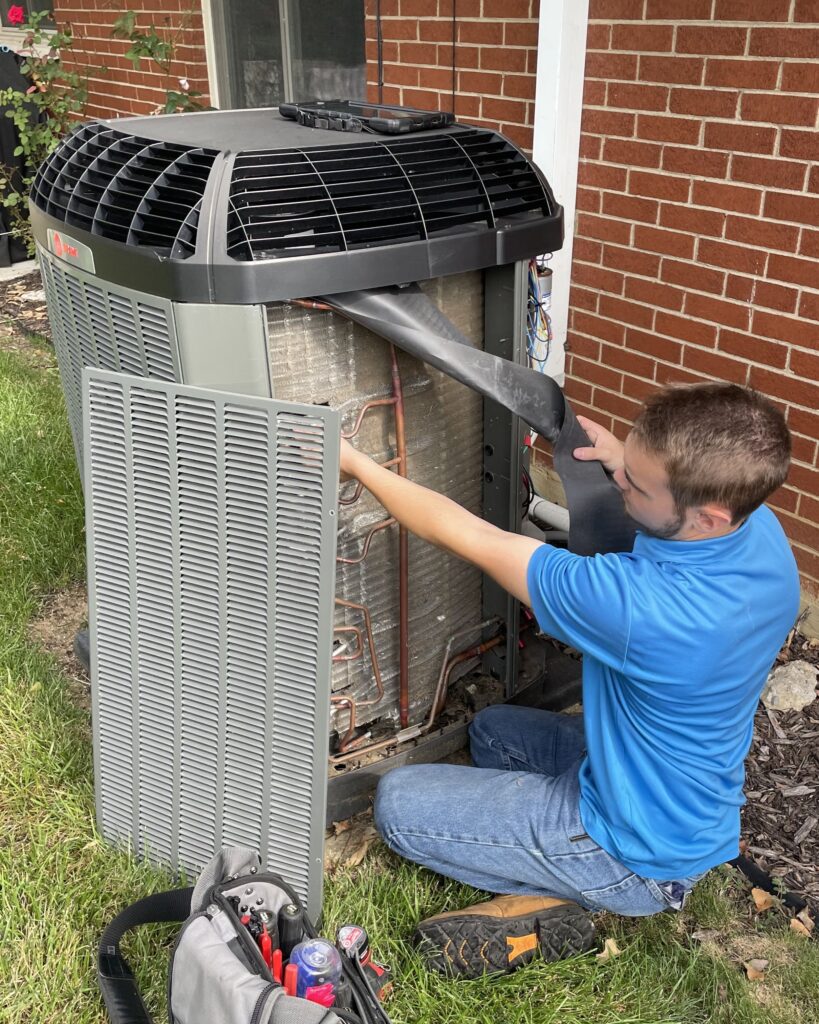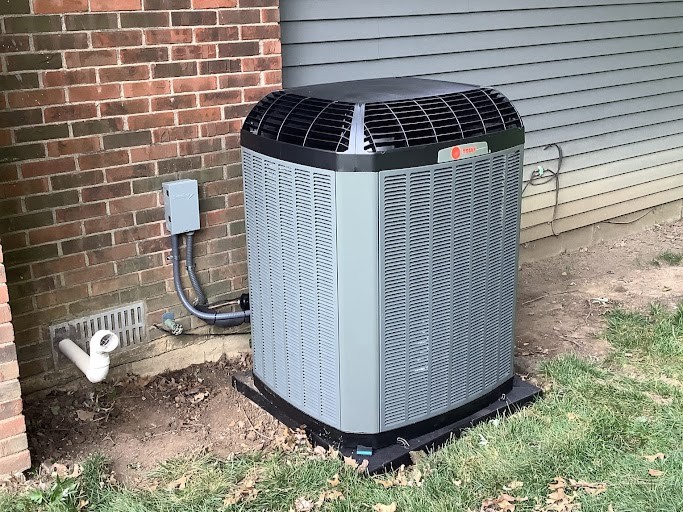If your air conditioner unit is suddenly making loud or unusual noises, don’t ignore it. Strange sounds can signal loose parts, system wear, or serious internal issues that can lead to breakdowns. Learn what these AC noises mean, what you can do, and when it’s time to call the pros at Logan Services.
What’s Causing the Noise in Your Air Conditioner?
Different sounds point to different problems. Here are the most common AC noises and what each one could indicate:
- Humming – Often caused by a worn belt or failing fan motor.
- Rattling – May indicate loose screws, debris in the unit, or a damaged compressor.
- Squealing – Frequently tied to motor or fan problems.
- Banging – Suggests something has broken or come loose inside the system.
- Hissing – Usually a sign of a refrigerant leak.
- Cracking or Popping – Often linked to issues in the ductwork or expansion valve.
Why Addressing AC Noise Matters
Ignoring AC noises won’t make them go away. In fact, minor sounds can lead to serious system damage, higher energy bills, and uncomfortable indoor temperatures. A quiet, efficient AC is key to comfort and reliability in your Ohio home.
DIY Tips To Quiet a Noisy AC Unit
You may be able to reduce or eliminate some noise with basic maintenance:
- Replace the Air Filter: Dirty filters restrict airflow and create pressure buildup. Replace filters every 1–3 months.
- Tighten Loose Screws or Bolts: If easily accessible, use a wrench or screwdriver to secure any loose screws or bolts on panels or components.
- Clean the Outdoor Unit: Use a garden hose to rinse off dirt and debris. Keep fan blades clear of leaves and buildup.
- Clear the Area Around the Unit: Remove any nearby branches or obstructions that could cause vibrations or block airflow.
If the sound continues after these steps, professional attention is needed.
When To Call an HVAC Technician
Not all AC issues can be fixed with a new filter or a quick cleanup. Call Logan Services if you notice:
- Persistent or Loud Noises: Grinding, popping, or hissing sounds that don’t stop often signal internal mechanical or electrical issues.
- Weak Airflow: Poor airflow from vents may be caused by duct blockages, blower issues, or clogged filters.
- AC Not Cooling: May be due to low refrigerant, compressor failure, or electrical faults.
- Moisture or Leaks: Water pooling around the unit or visible leaks could signal refrigerant leaks or condensate drainage problems.
A certified technician can inspect the unit, check fan blade condition, and replace or repair any failing components.
How To Prevent Future AC Noises
Proactive care keeps your system quiet and efficient. Here’s what we recommend:
- Install the Unit on a Level Surface
Uneven installations can cause vibrations and banging sounds. - Maintain Clear Space Around the Unit
Keep at least 2–3 feet of clearance around the condenser for proper airflow. - Inspect for Loose Parts Regularly
Check panels, fasteners, and outdoor components each season. Do not risk opening up your own unit to make more in-depth fixes. - Schedule Annual AC Tune-Ups
Regular service catches minor issues before they become noisy problems.
Is It Time To Replace Noisy, Worn-Out AC Parts?
Older air conditioners often develop sound-related issues as components wear out. These noises can help identify what needs attention:
- Buzzing – May point to electrical problems or worn fan blades.
- Hissing – Often indicates a refrigerant leak.
- Clicking – Could be caused by thermostat or relay issues in the electrical system.
Logan Services can diagnose the root cause and recommend a repair or replacement that fits your needs and budget.
Preventative Maintenance: Protect Your System and Avoid Noisy Breakdowns
Regular HVAC maintenance is the most effective way to reduce noise, improve efficiency, and extend the life of your air conditioner. At Logan Services, we offer affordable maintenance plans designed to keep your system running quietly and reliably year-round.
Benefits of Logan Services Maintenance Plans:
- Biannual Tune-Ups: Ensure your system is clean, lubricated, and running efficiently before the heating and cooling seasons begin.
- Priority Scheduling: Get fast service when you need it most—even during peak season.
- Discounted Repairs: Save on unexpected parts and labor costs when issues arise.
- Noise Prevention: Technicians check for loose parts, worn belts, debris buildup, and airflow issues that commonly lead to strange sounds.

Protect your comfort and your budget—enroll in a Logan Services maintenance plan today. For homeowners in Dayton, Columbus, or Cincinnati, we’ll make sure your AC stays quiet, efficient, and reliable all summer long.
Trust Logan Services for Noisy AC Repairs in Dayton, Columbus, and Cincinnati
Since 1969, we’ve provided fast, friendly service to Ohio homeowners dealing with noisy systems, refrigerant leaks, or complete AC failures. We always strive to provide free, same-day estimates and next-day installation. You can trust that we have a system for every home and budget. We make your comfort our priority—call now to schedule your AC service with Logan Services.
Know When to Call and What’s Normal
Air conditioning systems are complex mechanical equipment, and some noise is completely normal, like the gentle hum of the fan or the faint click when the system cycles on or off. However, if you hear sudden, loud, or persistent noises that seem unusual, it’s best not to ignore them.
When in doubt, reach out to Logan Services. Our experienced HVAC professionals can quickly determine whether the noise is part of normal operation or a sign of something more serious. Your comfort and peace of mind are always our priority.
FAQs About AC Noises
Rattling often comes from loose screws, disconnected ductwork, or debris. Have it inspected to prevent long-term damage.
Buzzing usually signals electrical issues like loose wiring or a failing compressor. Turn off the system and call a technician.
This could mean there’s a refrigerant leak or a ductwork issue. Both need prompt repair for safety and efficiency.
A high-pitched squeal usually indicates a worn or slipping fan belt or issues with the motor bearings. If the noise starts suddenly or gets louder, schedule service to prevent further damage.
Yes. Certain noises, such as hissing (indicating a refrigerant leak) or buzzing (suggesting an electrical fault), can signal safety hazards. Continuing to run a noisy unit can also cause damage to critical components like the compressor or fan motor.





















